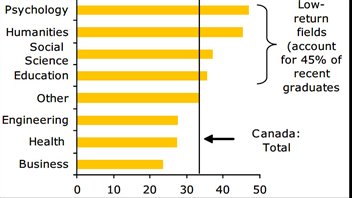The study by CIBC World Markets, looked at university graduates and their earning level.

Enenagor, co-auhor
of the CIBC report
© CIBC
It showed that higher education was still likely to result in higher incomes in a job, but that it was no longer a sufficient condition.
It pointed out that university graduates in some fields of study did not fare as well as those in others which are more in demand
Emanuella Enenajor is an economist with CIBC, and a co-author of the report
ListenThe cost of a university education in Canada is high.
The study showed that tuition was roughly double the average of OECD (Organisation for Economic Co-operation and Development) countries. Yet, in terms of the percentage of adults with higher education, Canada in fact had the highest proportion among OECD countries.
The CIBC report also supported the old adage that a degree will result in higher earnings. A Bachelors degree on average adds a 30% premium to earnings compared to high school graduates, A Masters or PhD adds 15% more to that.
Ms Enenajor expressed some surprise when their findings showed a negative “return on investment” (ROI) for a university degree in some fields. The research showed that graduates in certain areas of study actually earned less than high-school grads on average.
In addition, the gap between earnings of a high school vs university education is narrowing, along with unemployment rates.

income © Statistics Canada- CIBC
It used to be that a university degree gave one a very good probability of employment, but recent statistics show that high school grads have only a 1.7% higher unemployment rate than university graduates.
In addition, during the past decade, real earnings of high school and college grads rose 13% compared to 8% for undergraduate degree holders, and was more than double the increase seen for MA and PhD holders.
The statistics also show that Canada also has the highest percentage of degree-holders earning less the half the median income of degree holders in the OECD.
Part of this poor statistical performance is due to the fact that about 50% of PhD’s in Canada are immigrants who are either unemployed or working at jobs below their education level
Another part of the equation can be attributed to the choices Canadian students make in their studies. The CIBC World Markets economists examined various reports that have attempted to compute an annualized average “return on investment” (ROI) on education and found stark divergences depending on the field of study.
Almost half of grads were in fields which earned less than the OECD median, with only three areas showing a higher potential for earnings growth.
CIBC Chief Economist Benjamin Tal says, “”Those underperforming sectors comprise just under half of all recent graduates. In other words, Canadian students are continuing to pursue fields where upon graduation, they aren’t getting a relative edge in terms of income prospects.”
Mr Tal notes that people have been aware for quite some time that some fields of study are on average, more in demand and will provide higher incomes thant others but notes, “It’s not clear that students, armed with that knowledge, have been making the most profitable decisions. With the exception of commerce, in the last 10 years we haven’t seen a meaningful influx of students into degrees with more advantageous earnings outcomes.”
The study says there is an oversupply of university graduates because many are in those fields which are less in demand and with lower income potential, while there is a shortage of grads to fill Canada’s needs in fields which are experiencing growth.
Among its several recommendations, the report concludes that on one hand a better system for recogniziong foreign credentials is needed, and on the other a better system for identifying future market needs and trends is required so that students will gravitate towards fields with a better chance of employment and earning potential.







For reasons beyond our control, and for an undetermined period of time, our comment section is now closed. However, our social networks remain open to your contributions.